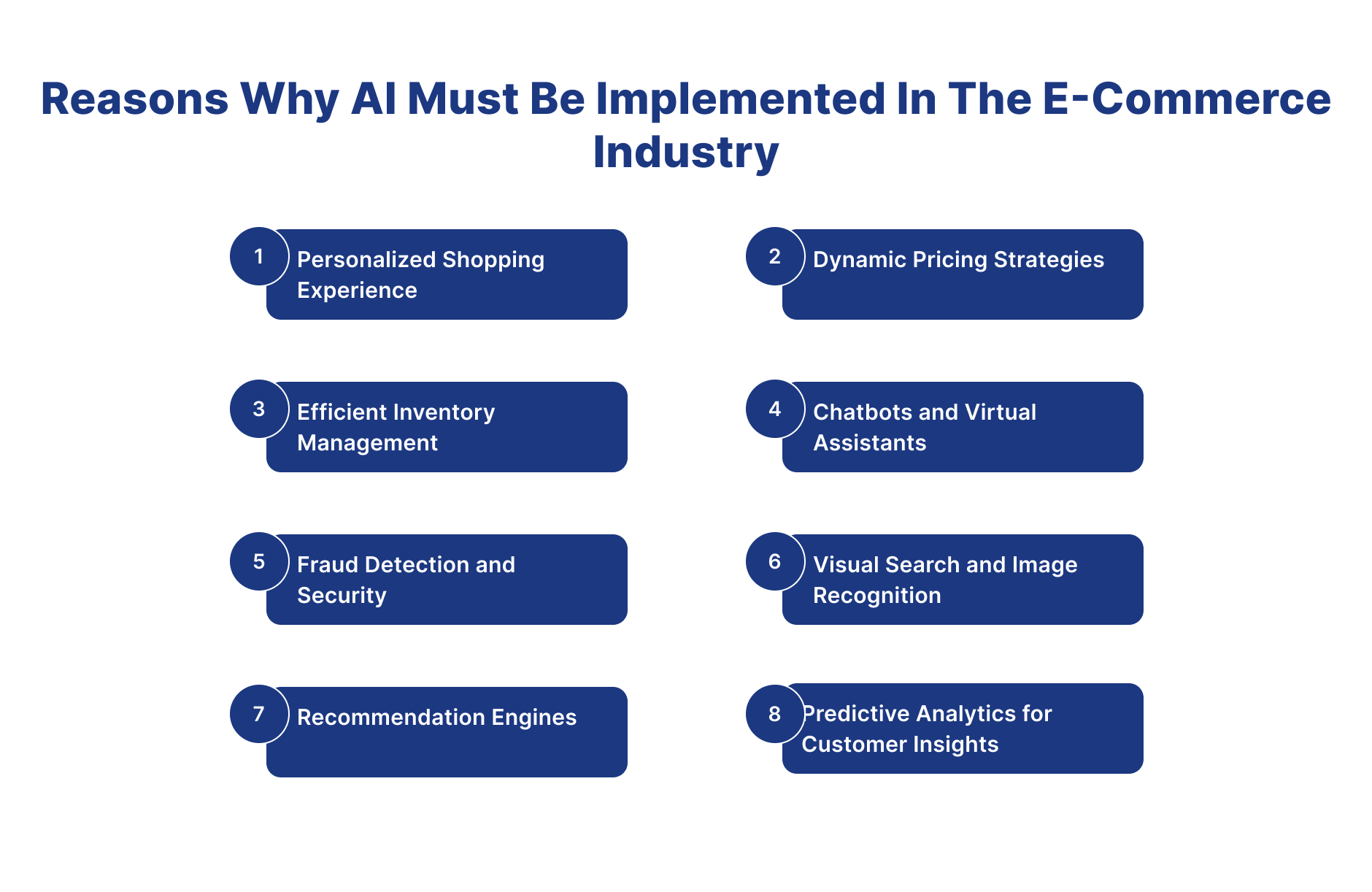8 Reasons Why AI Must Be Implemented In The E-Commerce Industry To Transform It
AI Must Be Implemented In The E-Commerce Industry has several advantages and has become critical tool for enhance customer experience
Introduction

- The e-commerce business is seeing exponential growth and severe rivalry in today's digital world. Businesses must employ innovative technology to remain competitive and fulfill the ever-changing expectations of their consumers. Artificial Intelligence (AI) technology has proven vital in the e-commerce sector. AI has several advantages and has become a critical tool for organizations to drive growth, enhance customer experience, and obtain a competitive advantage. This blog will explore 8 reasons AI must be implemented in the e-commerce industry.
Reasons why AI must be implemented in the e-commerce industry

1.Personalized Shopping Experience:
-
A one-size-fits-all approach to the buying experience characterized the conventional e-commerce environment. Websites offer all users the same selection of items and promotions, regardless of individual preferences or purchasing history. Customers were lost in a sea of alternatives, resulting in a generic and frequently impersonal contact with the site.
-
Artificial intelligence enables e-commerce platforms to provide personalized shopping experiences based on individual preferences. AI algorithms may propose items, generate customized marketing campaigns, and optimize website interfaces by analyzing user behavior, purchase history, and preferences. Personalization improves not just customer happiness but also conversion rates and client loyalty. For this reason, AI must be implemented in the e-commerce industry.
2.Dynamic Pricing Strategies:
-
Traditionally, e-commerce used static pricing models, in which product prices were manually established and modified at regular intervals. This technique had limits since firms found it difficult to adapt quickly to market dynamics, competition pricing adjustments, or demand swings. Because of the lack of real-time modifications, opportunities to maximize income or react to changing market conditions were frequently missed.
-
Using AI-driven dynamic pricing, e-commerce enterprises may modify prices in real-time depending on factors like demand, competition pricing, and market trends. This adaptability assures competitive pricing, maximizes income, and allows enterprises to respond quickly to market changes. AI systems have the ability to examine massive volumes of data in order to enhance pricing tactics and overall profitability. For this reason, AI must be implemented in the e-commerce industry.
3.Efficient Inventory Management:
- Manual tracking, frequent assessments, and dependence on historical data were common characteristics of traditional inventory management systems in e-commerce. Businesses struggled to estimate demand effectively, resulting in concerns such as overstocking or stockouts. These inefficiencies resulted in higher holding costs, lost sales opportunities, and dissatisfied customers.

- AI is crucial in optimizing inventory management procedures. E-commerce enterprises may estimate demand, avoid overstocking or stockouts, and improve supply chain operations using predictive analytics and machine learning algorithms. As a result, holding costs are decreased, order fulfillment is enhanced, and market demands are met more quickly. For this reason, AI must be implemented in the e-commerce industry.
4.Chatbots and Virtual Assistants:
-
Customer service was mostly human-centric in the early days of e-commerce. Human agents were used by businesses to answer client questions, help customers through the purchase process, and resolve problems. However, there were drawbacks to this strategy in terms of scalability, availability, and reactivity. Working hours hampered human agents, potentially resulting in response time delays, and addressing routine requests required a large amount of personnel.
-
AI-powered chatbots and virtual assistants improve e-commerce customer service and engagement. These intelligent systems can answer consumer questions, propose products, and lead customers through purchasing. Businesses may free up human resources for more difficult work while providing round-the-clock customer service by automating basic interactions. For this reason, AI must be implemented in the e-commerce industry.
5.Fraud Detection and Security
-
Security precautions in the early phases of e-commerce were frequently reactive and depended on rule-based systems. Manual reviews, rule-based algorithms, and periodic audits were all traditional approaches for detecting fraudulent activity. These tactics struggle to keep up with the fast-changing cyber threat scenario. Businesses were constantly faced with the issue of recognizing and managing fraudulent transactions, frequently after financial losses had occurred. This reactive approach resulted in financial losses and jeopardized client confidence.
-
AI-powered fraud detection solutions are critical for e-commerce platforms in the face of growing cyber threats. Machine learning algorithms analyze transaction patterns, detect abnormalities, and flag potentially fraudulent actions in real time. AI helps safeguard organizations and customers from online fraud's financial and reputational costs by improving security procedures. For this reason, AI must be implemented in the e-commerce industry.
6.Visual Search and Image Recognition
-
Product search functionality was mostly centered on text-based inquiries in the early phases of e-commerce. Users were asked to express their search requirements using keywords, and results were created based on the matched text. While useful to some extent, this strategy had limits, particularly when customers failed to define a product adequately. The search procedure was less straightforward, and discovering certain things might be time-consuming and unpleasant.
-
AI-powered visual search skills are changing the way people find things online. E-commerce systems that use image recognition technology can allow consumers to search for things using photos rather than words. This improves the search experience, decreases friction in the purchase cycle, and raises conversion rates. For this reason, AI must be implemented in the e-commerce industry.
7.Recommendation Engines
-
Product suggestions were relatively simple in the early days of e-commerce and lacked the delicacy required to captivate individual tastes properly. These systems depended on broad categories and general recommendations, sometimes resulting in ineffective cross-selling and upselling techniques. Customer experiences were fairly standardized, leveraging personalized information for greater engagement.
-
AI-powered recommendation engines evaluate user data and behavioral trends to propose appropriate items. These engines improve cross-selling and upselling prospects through collaborative or content-based filtering. E-commerce enterprises may increase average order value and produce additional revenue by displaying goods matching users' interests. For this reason, AI must be implemented in the e-commerce industry.
8.Predictive Analytics for Customer Insights
-
Understanding consumer behavior and preferences in conventional e-commerce relied on historical data analysis and intuition. Businesses frequently failed to predict future market trends and lacked the proactive insights required for strategic decision-making. In a fast-changing industry, relying on retroactive data hindered the capacity to make timely and educated judgments.
-
By utilizing predictive analytics, E-commerce enterprises may acquire important insights into client behavior and preferences. AI models can predict trends, identify high-value consumers, and optimize marketing campaigns. Businesses may customize their services, marketing efforts, and inventories to market demands by knowing and anticipating client wants. For this reason, AI must be implemented in the e-commerce industry.
9.Rapid Technological Evolution
- AI systems can unintentionally reinforce biases found in training data. Biassed algorithms can affect patient outcomes in the healthcare industry by causing discrepancies in diagnosis and treatment. To guarantee impartial and equitable medical equipment, manufacturers must prioritize ethical issues and aggressively seek to uncover and correct biases in both the training data and the algorithms themselves; because of this, AI fail in manufacturing Healthcare equipment.
Conclusion
- AI application in the e-commerce sector is more than just a technology update; it is a strategic need. AI alters how businesses run and interact with consumers, from personalized shopping experiences to efficient inventory management and adequate security measures. Embracing AI is about changing the future of e-commerce and building a frictionless, intelligent, and customer-centric online purchasing environment. As the digital environment evolves, incorporating AI is no longer an option; it is the key to unlocking enormous possibilities and sustaining success in the volatile world of e-commerce.
How Digiqt Will Help You To Implement AI In Your Company
-
At Digiqt, we are dedicated to assisting companies in automating critical processes. Our highly skilled and professional team ensures the timely development and delivery of AI software. We commence by thoroughly understanding our client's specific requirements, and based on these requirements, our proficient team develops the AI software. Furthermore, we provide our clients monthly updates on the software development progress.
-
Digiqt's commitment to automation, client-centric software development, and regular updates ensures efficiency and effectiveness in streamlining insurance operations.
Contact Us
Frequently Asked Questions
What are 8 Reasons Why AI Must Be Implemented In The E-Commerce Industry To Transform It?
8 Reasons Why AI Must Be Implemented In The E-Commerce Industry To Transform It are AI-powered systems that automate and optimize processes using machine learning, natural language processing, and intelligent decision-making capabilities.
How do 8 Reasons Why AI Must Be Implemented In The E-Commerce Industry To Transform It work?
8 Reasons Why AI Must Be Implemented In The E-Commerce Industry To Transform It work by analyzing data, learning patterns, and executing tasks autonomously while integrating with existing systems to streamline operations and improve efficiency.
What are the benefits of using 8 Reasons Why AI Must Be Implemented In The E-Commerce Industry To Transform It?
The benefits include increased efficiency, reduced operational costs, improved accuracy, 24/7 availability, better customer experience, and data-driven insights for decision-making.


















